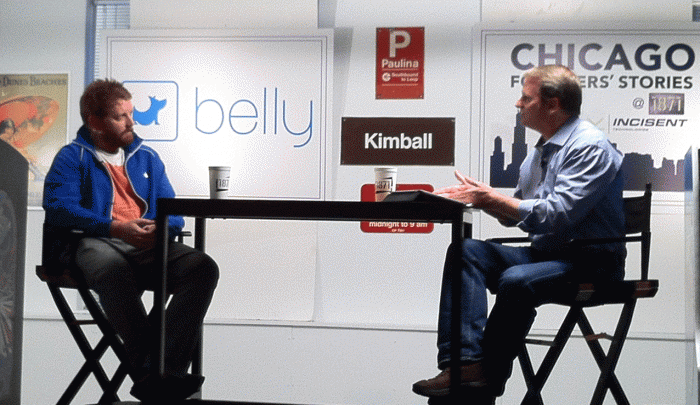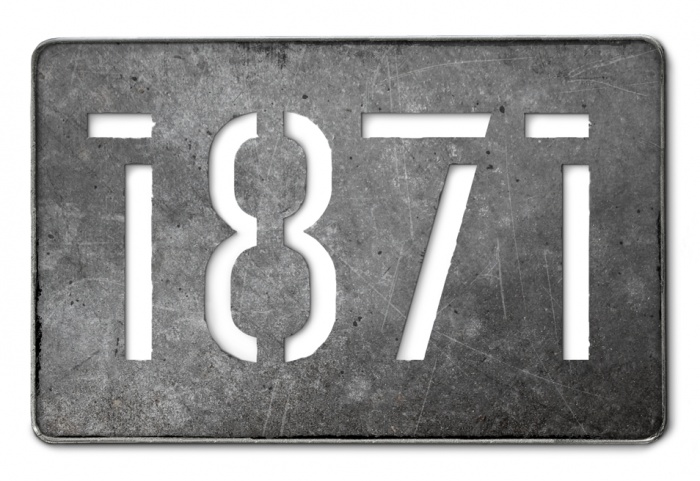

This months Founder Stories at 1871 featured Logan LaHive, the founder and CEO of Belly, a digital loyalty platform that’s increasingly inescapable. The goal of the Founder Stories series is to help the audience define and solve problems in ways that are innovative and meaningful.
On Wednesday night, LaHive shared the origins of his ideas, his entrepreneurial history, and his tips on how to survive the early struggles every founder faces with the 250 people who attended the sold out event.
The origins of Belly
Belly is a digital loyalty platform that creates custom, unique loyalty programs for small businesses. Known for it’s quirky rewards, Belly helps businesses create, manage, and run better, smarter loyalty programs. On the consumer side, the goal of Belly was to replace a wallet full of clutter with a mobile app or a single card.
LaHive points out that there are three main parts of a small business: new customer acquisition, how much customers spend and how often they come in, also known as loyalty. It was the problem of loyalty that he was set on solving with Belly. Although the start-up also improves new customer discovery it began with a focus on increasing customer frequency and providing a great experience.
“Most small businesses will tell you they would love to acquire new customers—that is the core of how to drive a business. [But] new customer acquisition is typically 6 to 8 times more expensive than keeping the current customer,” LaHive said. To do this they needed to create a system with little friction that added value to the merchant and the consumer. “What we really set out to solve was to convince them of the value, ROI and tractability of a loyalty program,” he said.
This was an uphill battle: “When you go into a small business they don’t have data. It’s incredibly difficult to say your customers are coming in more often after using Belly because they have no pre data set before we install,” LaHive said.
LaHive’s entrepreneur track pre-Belly
LaHive has always been focused on being an entrepreneur —it was even his major in college. Pre-Belly, LaHive worked at Redbox where he developed the “New Business Group” with Mark Achler, allowing him to focus on more than just movie rentals. The formation of this department allowed LaHive to stay on an entrepreneurial track despite working in a large company that was publically traded.
He was then hired at Lightbank as an entrepreneur in residence. LaHive came into Lightbank with the intention of starting a business focused on loyalty. His ideas really came alive after he quit going to formal internal meetings and started spending his time out in front of the users, customers and merchants. “I decided I wasn’t going to talk theoretically about loyalty as a space. I was just going to build it,” LaHive said.
Belly focuses on the typical consumer, not the tech-savvy crowd
He began to focus on something that is under-valued in the local entrepreneurial community: selling. LaHive says that it was this process of getting rejected and learning what merchants responded to that helped him get the feedback he needed to craft a successful business.
Merchants wanted a verified in-store visit (unlike Foursquare where you can check in when just walking by) and a solution that went beyond mobile. “50 percent of the U.S. population doesn’t have a smartphone. To be universal and to get businesses to give up what they are currently doing you needed to have a paper component,” LaHive said. This is where the physical card comes into play.
According to LaHive, many people ignore the fact that when you are building a business you need to build it using technology that is available today. “People don’t care about what is going to happen in 2015. They care about getting the deal on that ice cream today. We are trying to build a business that people actually use,” LaHive said.
“You don’t need to be on tech blogs to build a successful business,” he continued. This is the reason why Belly has not tried to tap into the competitive, tech-obsessed market in San Francisco. Instead, they are focusing on the 99 percent of the population.
This focus is the reason why using a physical card worked and why LaHive has no plans to do away with the in-store iPads. “They are a core part of the solution and a great marketing tool. People may forget that they signed up for Belly but when they see an iPad at the point of sale we have a chance to recapture the consumer,” he said.
Advice for eliminating distractions and surviving the early struggles
When speaking on the struggles of founding Belly, LaHive said that most great ideas seem silly to everyone but the founders because no one is ever as close to the idea as they are. “People thought I was an idiot for putting customized plans, iPad’s in-store and using physical loyalty cards,” LaHive said.
While many would-be founders get distracted listening to the advice of mentors, LaHive realized that no one knows the market, the target audience and the idea better than the founder. “You need to go out, live it and immerse yourself in the idea. A lot of people will have different feedback and advice but they haven’t spend the time, energy and the passion living, breathing and dreaming about this market and this space like the founder,” LaHive said.
